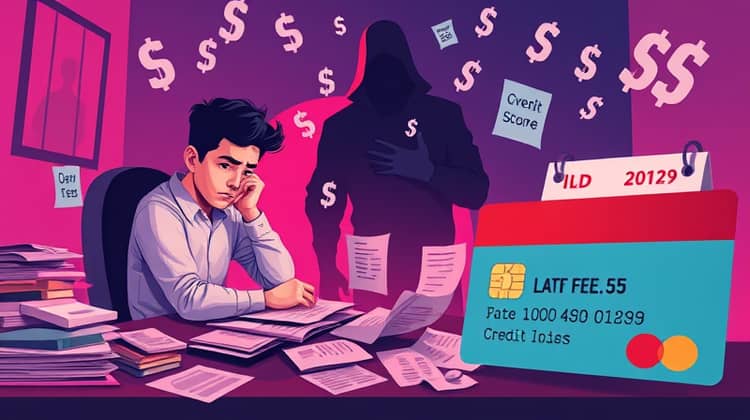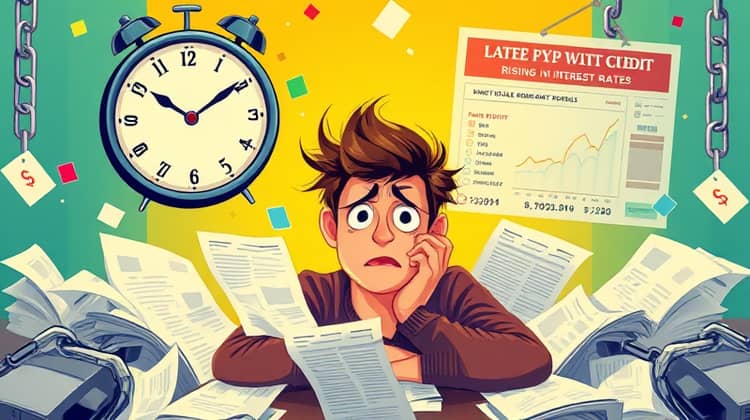Credit Card Late Fees: 7 Tips to Avoid Them and Save Money

Credit cards have become an essential part of modern-day financial management. However, missing payment deadlines can lead to costly late fees that can accumulate and negatively affect your credit score. Understanding how these delayed payments work and managing them proactively is key to maintaining financial health.
In this article, we will explore the concept of late fees associated with credit cards, the potential consequences of late payments, and provide you with seven effective tips to avoid incurring these frustrating fees altogether. Implementing these strategies will not only help you stay organized but also ultimately save you money.
Being diligent with your payment habits can enhance your financial well-being and ensure you get the most out of the benefits your credit card can offer. Let's dive into understanding late fees and how to prevent them from impacting your finances.
Understanding Late Fees

Late fees on credit cards are penalties charged by issuers when a payment is not received by the due date. These fees can vary depending on the issuer and can range from $25 to $40 or more. This fee can be a significant burden for someone already struggling to manage their financial obligations.
In addition to the immediate cost of a late fee, there may be other hidden effects. For example, your credit score could be negatively impacted if you consistently miss payment deadlines, which can lead to higher interest rates and affect your ability to secure credit in the future.
Understanding the dynamics of late fees can motivate you to be more proactive about your credit card payments. The more aware you are of the timings and consequences, the more likely you are to avoid these costly pitfalls.
The Consequences of Late Payments

Late payments can have more severe consequences than just a one-time fee. It can lead to an increase in your interest rates, as many credit card companies penalize customers who frequently pay late. This means that even if you make payments in the future, you could still be paying more due to a higher interest rate.
Additionally, a negative mark for late payment can stay on your credit report for several years. This can make it difficult to obtain new credit products or loans at a favorable rate. In essence, the ripple effects of a single late payment can take a long time to heal.
- Loss of interest-free grace period
- Increased interest rates on future purchases
- Potential impact on credit score
- Difficulty in obtaining future credit
- Risk of becoming trapped in a cycle of debt
With the potential for so many consequences, it is crucial to prioritize timely payments. In the next section, we will explore practical tips to help you avoid these late fees altogether.
7 Tips to Avoid Credit Card Late Fees

Managing credit card payments can feel overwhelming, but by implementing a few simple strategies, you can ensure fewer late fees and lower financial stress. Here are seven tips to help you stay on top of your credit card payments:
1. Set Up Automatic Payments
One of the simplest ways to avoid late fees is to set up automatic payments. Most credit card companies allow you to set up automatic payments to ensure your minimum payments are made on time without any additional effort from you.
This feature can be particularly beneficial if you have a busy lifestyle or tend to forget your due dates. By scheduling automatic payments, you secure yourself from late fees while maintaining your credit score.
- Choose the minimum amount due
- Consider paying the full balance to avoid interest
- Double-check that funds are available to cover payments
Remember to periodically review your automatic payment settings to ensure they are up-to-date with your current financial situation.
2. Create Payment Alerts
Setting up payment alerts is another effective way to stay informed about your due dates and prevent late payments. Most banks and credit card companies offer the option to send notifications via email or SMS.
These alerts can be timed to remind you a few days before your payment is due, giving you ample time to ensure you have the funds available or make necessary arrangements. A simple reminder can work wonders and keep your credit account in good standing.
- Set reminders for at least three days before the due date
- Include alerts for upcoming billing cycles
- Customize notifications based on your preferences
By proactively setting up alerts, you'll be less likely to forget your payment deadlines.
3. Know Your Due Dates
Understanding your billing cycle and payment due dates is essential for preventing late fees. Many credit card companies provide statements outlining when payments are due and your current balance. Knowing this information helps prepare you mentally and financially for when payments are expected.
Marking these dates on your calendar or utilizing financial management apps can help keep your credit obligations front and center. Consider using color-coded calendars for better visibility.
4. Change Your Due Date
If you find that your credit card payment due date does not align with your income schedule, consider contacting thecredit card provider to change it to a more manageable date. Adjusting your due date can ease your financial planning and ensure that you have the necessary funds when the payment is due.
This small adjustment can lead to saving you money in late fees and improve your overall stress levels.
5. Pay Multiple Times a Month
If your budget allows for it, paying multiple times a month can significantly reduce the risk of incurring late fees. Making smaller payments can help you stay on top of your balance and make it easier to manage cash flow throughout the month.
This practice will also reduce your total interest payments in the long run by lowering your average daily balance—it’s a win-win!
6. Use a Balance Transfer
A balance transfer is when you move debt from one credit card to another, usually to take advantage of a lower interest rate. If you find it challenging to keep track of multiple payments, consider consolidating your debt onto a single card, which may also offer a promotional 0% interest rate for an initial period.
While this strategy can offer relief, it’s crucial to not accumulate more debt on the original card or the newly transferred balance.
- Check the terms and fees associated with balance transfers
- Keep an eye on the promotional period's end date
- Stop using the card you transferred debt from to prevent further fees
Using this option wisely can simplify your payment process and help you avoid falling behind.
7. Request a Waiver
If you find yourself facing a late fee despite your best efforts, it may be worth contacting your credit card issuer and requesting a waiver. Many companies are willing to remove a first-time late fee, especially if you have a history of making timely payments.
Simply explain your situation and ask politely if they can waive the fee. Building a good rapport with your issuer can help in such scenarios.
Conclusion

Navigating credit card payments can be challenging, but by taking proactive steps, you can avoid costly late fees and protect your credit score. Understanding the structure of late fees and the impact of late payments is essential for informing your financial strategies.
By implementing the tips outlined in this article, you can create a more manageable financial landscape, reduce stress, and save money. Remember, staying organized and informed is key to successful credit management.






